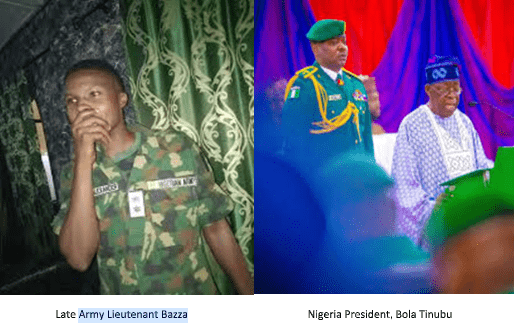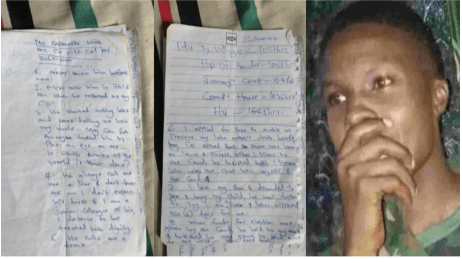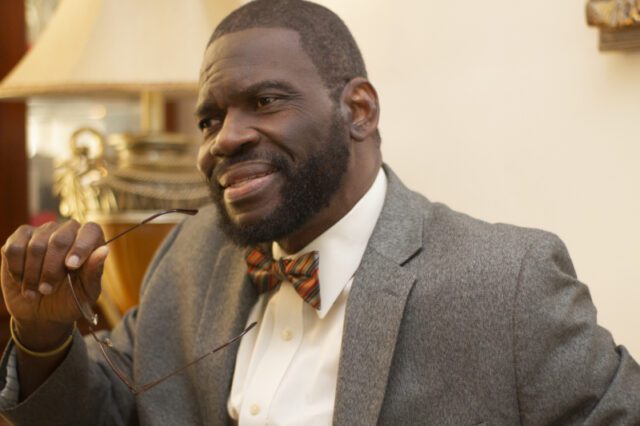National Issues
Urgent Appeal: Lieutenant Bazza – This Could Have Been Your Son, President Tinubu; Please Act Now -By John Egbeazien Oshodi
In light of these heart-wrenching revelations, I implore Your Excellency not only to spearhead a thorough investigation but also to champion the implementation of comprehensive leadership training programs. These programs should instill a culture of ethical conduct, empathy, and respect, aiming to prevent instances of abuse and mistreatment within our military ranks.

President Bola Ahmed Tinubu, Commander-in-Chief of the Armed Forces Federal Republic of Nigeria, I extend my greetings with a heavy heart as I address you regarding the recent revelations surrounding the tragic death of Nigerian Army Lieutenant, Alphonsus Alexander Kalthy Bazza.
I am compelled to bring to your attention the latest developments regarding the tragic demise of Lieutenant Alphonsus Alexander Kalthy Bazza, which has taken a disturbing turn with the emergence of additional information and suicide notes.
The initial statements from the Headquarters of the 6 Division, Nigerian Army, led by Maj. Jonah Danjuma, appeared to downplay the circumstances of Lieutenant Bazza’s death, attributing it to duty-related reasons during Exercise Still Waters III. However, subsequent revelations, particularly the handwritten notes obtained by Sahara Reporters, unveil a different narrative—one marked by frustration, strained relationships with his superior, and the alleged withholding of election allowances. Such contradictions are not unique to the military; they reflect a deeper-seated pattern within the institutional makeup of a challenged society—a defensive posture, indirect warnings to the media, and promises of further investigations.
Contrary to the assertions made by Major Jonah Danjuma, the Acting Deputy Director of 6 Division Army Public Relations, it has come to light that Lieutenant Bazza left behind handwritten notes detailing the challenges he faced, including strained relationships with his superior officer, Lt Col NY Suleiman Baburka and the withholding of election allowances. These notes, as reported by Sahara Reporters, paint a troubling picture of the young officer’s experiences leading up to his untimely death.
Any effort to dismiss or manipulate the content of Lieutenant Bazza’s suicide notes lacks justification in light of the explicit mentions of his aggressor and abuser. The Nigerian institutions’ denial mentality and inclination to label stories as “fake news” are inadequate in the face of this stark reality and imagery presented by the handwritten accounts. The specific details outlined in the notes regarding the challenges faced by the deceased officer demand a sincere acknowledgment of the gravity of the situation. It is imperative to conduct a comprehensive and impartial investigation to address the concerns raised in the notes and ensure that justice prevails.
The evolving narrative calls into question the transparency and thoroughness of the initial investigation. The stark contrast between the official statement and the contents of the suicide notes demands a more comprehensive and impartial inquiry to uncover the truth. It is imperative that the investigation addresses the concerns raised by these revelations, ensuring accountability and justice for Lieutenant Bazza and his grieving family.
The reported instances of biased behavior, mistrust, and verbal abuse, coupled with the alleged mishandling of election allowances, demand an urgent and impartial investigation. The gravity of these allegations calls for a transparent inquiry to ensure justice is served and to address any systemic issues within the military hierarchy.
Furthermore, these revelations shed light on the psychological toll experienced by Bazza, evident in the loss of his son, challenges in obtaining leave, and instances of derogatory language. His words resonate deeply: “Whenever he speaks to me in his office, he raises his voice and always asks me to get out of his office. He calls me a wounded liar in front of soldiers. I expect, as my superior, to let him mentor me and not me constantly insulting my post.”
While Lt Col NY Suleiman Baburka may have his own perspective on this matter, the paramount concern is the pervasive issue of such harrowing stories within our nation. The silent struggles of countless individuals, like Lieutenant Bazza, often go unheard, concealed by a veil of silence that perpetuates the suffering of those who have endured mistreatment.

This is not an isolated incident; it is a poignant reflection of a broader systemic challenge where the voices of the victims are stifled, and their stories remain untold. In a society where the weight of bad experiences is often buried beneath the rug, we risk losing the opportunity to address these critical issues and save others from the same fate.
The pain and injustice suffered by Bazza echo the silent cries of many who have faced similar circumstances. In the memory of this anguished young officer, let us pledge to break the chains of silence that bind the voices of those who endure hardship. The stories of the victims should not be allowed to fade away, lost in the noise of daily life.
The notes left behind by Bazza reveal a narrative of anguish, suggesting a disheartening relationship between military officers and their commanders. The accusations of mistreatment, and an absence of empathy speak to a larger, systemic problem that requires immediate attention. Our nation’s leaders must embody values of integrity, humility, and a genuine concern for those under their command.
As we mourn the loss of a promising young officer, we are confronted with the realization that our society cannot sustain itself on a foundation of despair and neglect. The call for leaders with a moral compass, a commitment to ethical conduct, and a profound fear of God echoes loudly. It is incumbent upon those in positions of authority to foster an environment where our military personnel can thrive, free from the shadows of undue hardships and despair.
Your Excellency, as a father and leader of our great nation, I implore you to consider the emotional weight of this tragedy. This could have been your son, enduring the burdens of a system that seems to have failed him. The pain and anguish felt by Lieutenant Bazza’s family are sentiments that resonate with any parent who envisions the dreams and aspirations of their child cut short.
This stark disparity between the official narrative and the uncovered truth raises grave concerns about the transparency and integrity of the investigation. Lieutenant Bazza was more than a soldier; he was a son, a husband, and a father, with dreams and aspirations cruelly cut short. Witnessing attempts to shield institutional images at the expense of acknowledging the human suffering and pain experienced by individuals like Lieutenant Bazza is disheartening.
As the Commander-in-Chief of the Armed Forces, I implore you, Mr. Tinubu, to intervene and ensure that a thorough, impartial, and transparent investigation is conducted into the circumstances leading to Lieutenant Bazza’s untimely death. The welfare and mental health of our military personnel should be of paramount concern, and any form of misconduct or mistreatment must be addressed urgently.
This situation serves as a stark reminder that behind the uniform and ranks are human beings—someone’s child, spouse, or parent. The pursuit of truth and justice is not only a duty but a necessity to honor the memory of Lieutenant Bazza and to prevent such heartbreaking incidents in the future.
Furthermore, these revelations shed light on the psychological toll experienced by Lieutenant Bazza, evident in the loss of his son, challenges in obtaining leave, and instances of derogatory language. His words resonate deeply: “Whenever he speaks to me in his office, he raises his voice and always asks me to get out of his office. He calls me a wounded liar in front of soldiers. I expect, as my superior, to let him mentor me and not me constantly insulting my post.”
Your Excellency, as a compassionate father and esteemed leader of our great nation, I beseech you to deeply contemplate the profound emotional weight of this tragic event. Picture, if you will, this could have been your son, grappling with the burdens of a system that appears to have let him down. The agony and despair experienced by Bazza’s family echo the sentiments any parent would feel when confronted with the shattered dreams and aspirations of their child.
In light of these heart-wrenching revelations, I implore Your Excellency not only to spearhead a thorough investigation but also to champion the implementation of comprehensive leadership training programs. These programs should instill a culture of ethical conduct, empathy, and respect, aiming to prevent instances of abuse and mistreatment within our military ranks.
The unfolding narrative casts a shadow over the transparency and rigor of the initial investigation. The glaring disparity between the official statement and the poignant contents of the suicide notes necessitates an exhaustive and impartial inquiry to unveil the unvarnished truth. It is crucial that the investigation addresses the profound concerns raised by these revelations, ensuring unwavering accountability and justice for Lieutenant Bazza and his grief-stricken family.
In the spirit of empathy and shared humanity, I implore you, Mr. Tinubu, to act decisively in the face of this tragedy, not only for Lieutenant Bazza but for the countless others who serve in silence. May this plea resonate not just as a call for justice but as an impassioned reminder that this could have been your son, sir.
Good Nigerians place their trust in your commitment to justice and the well-being of our servicemen and women.

John Egbeazien Oshodi
Professor John Egbeazien Oshodi, who was born in Uromi, Edo State, Nigeria, to a father who served in the Nigeria police for 37 years, is an American-based police and prison scientist and forensic, clinical, and legal psychologist. A government consultant on matters of forensic-clinical psychological services in the USA; and a former interim associate dean and assistant professor at Broward College, Florida. The Founder of the Dr. John Egbeazien Oshodi Foundation, Center for Psychological Health and Behavioral Change in African Settings. In 2011, he introduced state-of-the-art forensic psychology into Nigeria through N.U.C. and Nasarawa State University, where he served in the Department of Psychology as an Associate Professor. He has taught at various universities and colleges including Florida memorial University, Florida International University, Broward college, Lynn University, and a contributing faculty member at the Weldios university in Benin Republic, Nexus International University, Uganda, Nova Southeastern University and Walden University in USA. He is a Human Rights Psychologist with a focus on African related environments. john.oshodi@mail.waldenu.edu




















